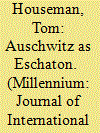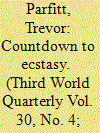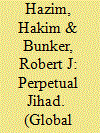| Srl | Item |
| 1 |
ID:
124625


|
|
|
|
|
| Publication |
2013.
|
| Summary/Abstract |
The recent engagement with 'post-secular' thought has been especially pronounced within the critical tradition, in which messianic eschatology has been variously rehabilitated or reaffirmed. Amongst others, the thought of Theodor W. Adorno has recently been enlisted in this endeavour, culminating in a synthesis of critical theory and Jewish Gnosticism. This article argues that such a reading not only misrepresents Adorno's thought, but also misses its critical contribution. In contrast to the project of revivifying the messianic in order to save critical theory from aimless nihilism, Adorno's eschatology, inherited through a critical dialogue with Hegel, Marx and Benjamin, is a negative imprint, devoid of the theism, teleology and promises of salvation that characterise and secure other appropriations of the eschatological tradition. To recognise the originality and potency of Adorno's critical reworking of eschatology, I argue, we must understand the theological role played by Auschwitz throughout his writings. Adorno constructs a constellation in which Auschwitz is the eschaton, the horrific fulfilment of the promise of history. In doing so, he reconfigures the ethical impulse of the critical tradition: critical theory derives its purpose and urgency not from the promise of a better world, but from the horror of the present one.
|
|
|
|
|
|
|
|
|
|
|
|
|
|
|
|
| 2 |
ID:
089500


|
|
|
|
|
| Publication |
2009.
|
| Summary/Abstract |
This paper examines the antinomies posed by a consideration of development as eschatology. Development is generally conceived as a grand narrative with humanity progressing inevitably to a redemptive goal, whether this be revolution or Rostovian consumerism. It is eschatological in structure. This opens development theory up to critique. Grand narratives premised on an end of history are open to criticism as utopian and exclusory through setting a limit-they conceive of a redemptive ending of time, but repress those excluded from the vision. However, this eschatological structure may also have a function in the shape of the Derridian conception of 'the promise'. This concept refers to a need to posit a closure that incorporates a redemptive, Messianic moment, which impels us to pursue the promise of that moment of development. Thus, the eschatological structure of development incorporates a risk of utopianism/exclusory violence-but we need the Messianic moment in order to conceptualise the goal that drives us to strive for progress.
|
|
|
|
|
|
|
|
|
|
|
|
|
|
|
|
| 3 |
ID:
067865


|
|
|
|
|
| Publication |
Aldershot, Ashgate, 2006.
|
| Description |
vii, 157p.
|
| Standard Number |
0754654508
|
|
|
|
|
|
|
|
|
|
|
|
Copies: C:1/I:0,R:0,Q:0
Circulation
| Accession# | Call# | Current Location | Status | Policy | Location |
| 050806 | 202.3/FEN 050806 | Main | On Shelf | General | |
|
|
|
|
| 4 |
ID:
077335


|
|
|
|
|
| Publication |
2006.
|
| Summary/Abstract |
Many Sunni and Shiite groups have embraced a more radical version of Islam spawned by Al Qaeda. Those who adhere to this version view the struggle within Islam and against the West as a perpetual jihad ordained by God until a just caliphate emerges. Their jihad must be viewed through the lenses of eschatology. This view focuses on the five prophetic stages of Islam. Four of these stages have come to pass with a future stage to result in the rise of the caliphate and the return of the Mahdi. In order to fulfill this fifth stage, Al Qaeda and other Sunni and Shiite networks are actively promoting jihad activity.
|
|
|
|
|
|
|
|
|
|
|
|
|
|
|
|